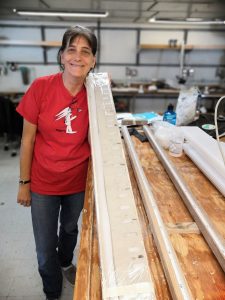
Liz Sikes is a professor of oceanography at Rutgers University and a paleoceanographer. The unifying theme of her work is carbon cycling. Her main science focus is investigating circulation in the Southern Ocean to determine how this traps and releases CO2 from the deep ocean on glacial time scales. Liz also investigates past sea surface temperature changes in the oceans around New Zealand and Australia, as well as the sources, pathways, and sinks of terrestrial and marine carbon in the modern environment to understand their impact on coastal ocean acidification. She has participated in 16 oceanographic research cruises ranging from diving with the Alvin submersible, collecting deep-sea sediment traps and cores, dredging, and water column sampling. While she has travelled to many oceans around the world, this is her first time sailing in the NW Atlantic Ocean.
An important aspect of her research concentrates on estimating the sea surface temperatures (SST) of the ocean. However, thermometer-based records only cover the last ~100 years, and to fully understand climate change on glacial- interglacial timescales (a record that spans 10,000+ years), it is important to examine how the SST has changed over that time period. Therefore it is important to investigate how SST can be recorded (i.e. proxies) in the preserved ocean sediment cores. Dr. Sikes works with two SST proxies, the alkenone- based proxy Uk37 (pronounced you-kay-37), and examination of the chemical composition of the calcium carbonate shells of zooplankton (i.e. foraminifera). The samples collected on this cruise will be prepared for a variety of geochemical, sedimentological, and paleontological studies to build a record of past climate and SST changes in the Northwest Atlantic Ocean.